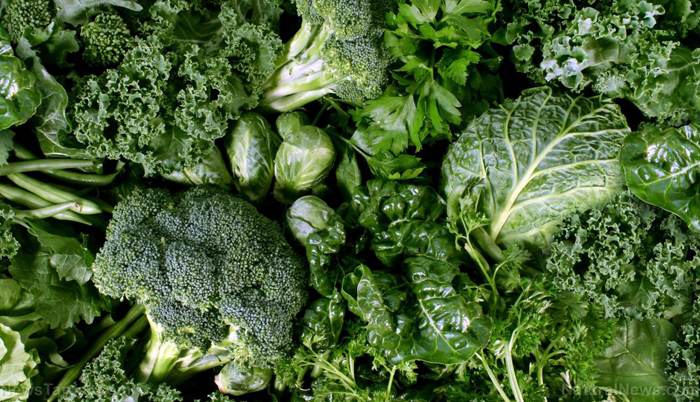![]() Home > Health
Home > Health
Study: Eating Leafy Greens Reduces Bone Fracture Risk Among The Elderly

News Target | Natural News
![]() December 9th, 2022 | 10:10 AM |
December 9th, 2022 | 10:10 AM | ![]() 797 views
797 views
NATURALNEWS
Eating green, leafy vegetables that are rich in vitamin K1 helps reduce the risk of fractures and hospitalizations later in life, according to a study.
The study published in Food & Function looked at 1,400 older Australian women for almost 15 years. Its authors from Edith Cowan University‘s Nutrition and Health Innovation Research Institute found that women who ate over 100 micrograms (mcg) of vitamin K1 were 31 percent less likely to have any fractures compared to those who ate less. Their dietary intake of vitamin K1 came from 125 grams of dark, leafy vegetables – about one to two servings.
Meanwhile, those who already suffered from broken hips also saw significant benefits from consuming vitamin K1 from vegetables daily. It resulted in a 49 percent risk of hospitalization due to fractures for them. (Related: Children and teens who supplement with vitamin K have a reduced risk of fractures.)
“Our results are independent of many established factors for fracture rates – including body mass index, calcium intake, Vitamin D status, and prevalent disease,” said nutritionist Marc Sim, the study’s lead author.
“Basic studies of vitamin K1 have identified a critical role in the carboxylation of vitamin K1-dependent bone proteins such as osteocalcin, which is believed to improve bone toughness.”
According to Sim, meeting the 100?g everyday dietary requirement of vitamin K1 is not difficult. One cup of raw spinach, for example, contains 145 mcg.
“Consuming this much daily vitamin K1 can easily be achieved by consuming between 75g and 150g – equivalent to one to two servings – of vegetables such as kale, broccoli, and cabbage,” he said.
According to the U.S. Centers for Disease Control and Prevention, 27.5 percent of older Americans reported falling in 2018. Falls are a leading cause of injury among the elderly, with some resulting in serious damage. In many cases, recovering from a fall is a significant challenge among the elderly.
Vitamins K1 and K2 are good for bone health
While vitamin K is more known for aiding in blood clotting, its role in bone health should not be overlooked. Aside from vitamin K1, which is primarily found in plant foods, there also exists vitamin K2, which is found in animal foods and fermented plant foods. Cheese, beef and the Japanese fermented soybean food natto are common sources of vitamin K2.
According to an April 2019 paper published in the Journal of Osteoporosis, gut bacteria convert vitamin K1 from dietary sources to vitamin K2. Together with vitamin D, vitamin K2 helps produce osteoblasts, cells that help in bone building. It also helps inhibit the production of osteoclasts, cells that break down bones.
The April 2019 paper concluded that low levels of vitamin K intake “are associated with risk of fracture, especially hip fracture, in observational studies.”
In another paper published June 2018 in BioMed Research International, researchers found that vitamin K2 helps direct calcium to the bones where they are more needed. Without vitamin K2, bones become porous and calcium accumulates in the arteries or organs – subsequently hardening in those areas.
Eating green, leafy vegetables rich in vitamin K1 and other foods rich in vitamin K2 every day is good for bone health.
Source:
courtesy of NATURALNEWS
by Olivia Cook
If you have any stories or news that you would like to share with the global online community, please feel free to share it with us by contacting us directly at [email protected]